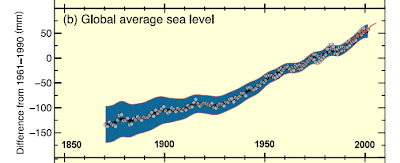IPCC TECHNICAL ASSESSMENT REPORT 5 – THESIS 2

Thesis: That the discussion of sea level rise in IPCC TAR4 has much to recommend as a model for other topics. Those of you who have already seen our first thesis, on global temperatures, may have got the impression that we were out to ‘get’ the IPCC. This is not the case. We are self-financed and have no agenda. As we say on our Home Page: “We are trying to prove only one thing: rational debate is possible when participants have access to the facts.” In TAR4 the increase in sea level is presented in the following graph. This graph appears as Figure 3 in the Summary for Policy Makers and elsewhere (We have extracted the sea levels from a compound graph which also showed Global Average Temperatures and Northern Hemisphere snow cover). It combines levels from tide gauges (circular dots) and satellite measurements (the red line). In the summary the accompanying text says: “Global average sea level rose at an average rate of 1.8 [1.3 to 2.3] mm per year over 1961 to 2003. The rate was fast...
